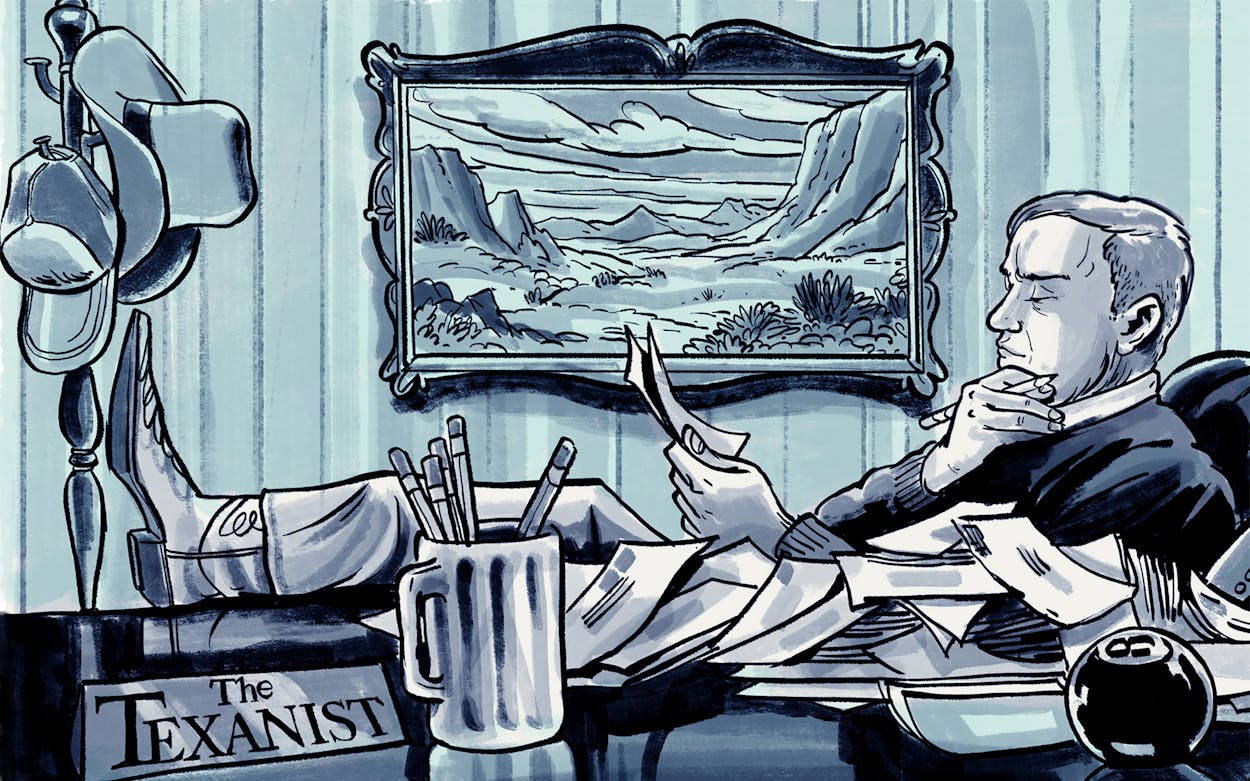Q: I have a friend who came across a brisket sale but didn’t need a brisket at the time, so he went ahead and purchased one and then promptly shoved it into his freezer. Then he posted on a forum of twenty-plus rowdy friends looking for counsel on how to go about thawing and cooking his frozen brisket. One year later, he’s still the target of endless frozen brisket jokes, jabs, and other culinary critiques. Are we being too harsh on him, or is freezing brisket an unforgivable sin in Texas?
Matthew McBride, Arlington
A: There are few things in this world as satisfyingly delectable as a beef brisket that has been prudently trimmed of its excess fats, carefully seasoned (with nothing but kosher salt, sixteen-mesh cafe grind black pepper, and, perhaps, a pinch of love), and then painstakingly smoked over a hardwood fire for enough hours to render this ornery primal cut so tender that upon the first mouthwatering bite you’ll close your eyes and momentarily see the face of your chosen higher power—or momentarily question your atheism.
Which is to say, barbecued brisket, when done right, is one of life’s great delights. On the other hand, when brisket is done wrong it can be the very furthest thing from delightful.
The span between the two ends of this meaty spectrum, which ranges from the toothsome to the gruesome, is a lengthy sweep. Along the way, there are the platonic ideals of succulent smoked protein, such as those found at the fifty spots on Texas Monthly’s quadrennial list of Texas’s top barbecue joints, the latest iteration of which is set to drop imminently. And then there are the more-than-respectable wares served by the establishments that made our honorable mentions list. (Not to mention the good stuff that’s produced by all the well-practiced backyard amateurs out there tending the fires.) And then, unfortunately, there are the cringe-inducing offerings from establishments that should have their food-service licenses revoked for serving up gray slabs of dead bovine flesh that not even a resident of Kansas City (which absurdly refers to itself as the “Barbecue Capital of the World”) would mistake for barbecue, no matter how much molasses-y sauce is slathered upon it.
As those words rolled off the Texanist’s fingertips, he was reminded of a letter he received several years ago, from an Oklahoman who wanted to know if there is such a thing as bad barbecue. The Texanist responded by recounting the tale of a most unhappy experience he once had at a so-called barbecue joint outside of Ozona, which definitively answered the question. Copying and pasting the words he wrote back then makes the Texanist shiver still: “A sliced Spam-like ‘brisket’ substance is served to him off a dirty electric griddle by an old woman with long whiskers and grimy fingernails . . .” Brrrrr!
It should be noted, though, that producing top-notch barbecue is not a walk in the park. Precisely where a particular brisket will land on the edibility continuum depends on several variables, including seasoning, fire tending, wood choice, pit style, pit condition, overall technique, barometric pressure, relative humidity, et cetera, all of which must fall into place just right.
And then, too, there’s the quality and state of the raw material itself—the meat at the center of the entire enterprise. The best brisket (unless you’re willing to spend hundreds of simoleons on pricey Wagyu) is, of course, fresh USDA Prime-grade brisket, which has more marbling than Choice or Select cuts of meat, which helps keep the brisket moist during the long smoking process. But Prime brisket, even at the H-E-B, can run you upwards of five bucks a pound, so you could be looking at a pretty substantial investment of, say, fifty to eighty bucks. And if you are in the market for Prime beef taken from stock that was treated humanely and never given antibiotics, or hormones, or growth-promoting drugs, you could pay a whole lot more than that. Creekstone Farms, which supplies Austin’s famous Franklin Barbecue with its all-natural beef, is right now charging a whopping $164 per brisket. So the Texanist, who is himself not made of money, sympathizes with your bargain-hunting friend.
But, still, the Texanist cannot recommend freezing a perfectly good brisket in the service of pinching a few pennies, for the simple reason that doing so will have no discernible effects on the pennies, but can have irreparable negative effects on the quality of the meat. Namely, the abundant intramuscular water held within the fibers of a big, juicy brisket will, when frozen, turn into ice crystals that can, when thawed, cause the meat to turn mushy. “I definitely prefer fresh briskets to frozen,” the world’s most renowned pitmaster, Aaron Franklin, tells the Texanist. “The amount of blood and water weight that ‘squeezes’ out when frozen can never be regained. Plus, if the brisket wasn’t frozen properly or if it’s gone back and forth, it’s going to suffer.”
But if one must, for whatever reason, freeze a brisket, all is not necessarily lost. “Plenty of great meat has been frozen and plenty of successful briskets have been made with previously frozen meat. In a perfect world I would cook fresh, but cook what you’ve got. Worst case scenario: Maybe it’s a bit mushy? Maybe it’s a bit tacky? I think it’s going to be okay,” advises Franklin. “Most people wouldn’t be able to tell.”
So while tossing a perfectly good brisket into the deep freezer is hardly the greatest of ideas, the Texanist cannot, under the advice of Aaron Franklin, find it in himself to regard it as a mortal sin worthy of a one-way ticket to Sheboygan, or even to Kansas City. The good ribbing (rim shot) by buddies should suffice.
That said, if this fella ever puts beans in his chili, or a period in “Dr Pepper” (as the Texanist once so eloquently put it, “There’s no period in ‘Dr Pepper.’ Period.”), or inquires about precise numbers with regard to someone’s acreage or cattle holdings, or fails to return a one-finger wave while motoring along a bucolic back-road, or gets sloshed and tries to go clockwise around a dance floor, or ever confuses the King of Country Music (George Strait) and the King of Western Swing (Bob Wills), or possesses anything less than a full appreciation of Willie Nelson’s entire oeuvre (including 1980’s execrable Danny Davis & Willie Nelson with the Nashville Brass), or isn’t terribly interested in the weather and those who like to talk about it, or is ever, in any way, the least bit unfriendly, be sure to give the Texanist a ring, as those no-no’s are of the sort that can lead to real trouble here in Texas.
Have a question for the Texanist? He’s always available here. Be sure to tell him where you’re from.
- More About:
- The Texanist
- Franklin Barbecue
- Brisket
- Aaron Franklin
- Arlington








